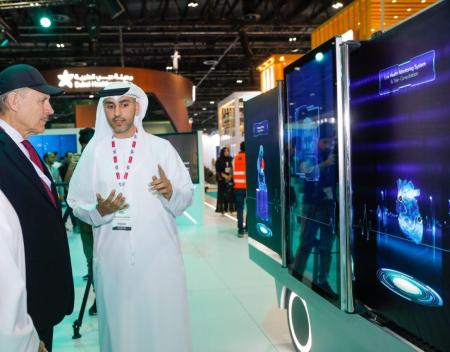The Ministry of Health and Prevention, MoHAP, recently unveiled the first of its kind project in the UAE for the smart connectivity between the National Ambulance services and hospitals.
This was announced during MoHAP’s participation in the Arab Health 2020, which is held at the Dubai World Trade Centre, January 27 – 30.
The new project comes as part of MoHAP’s endeavors to explore the healthcare future and achieve the objectives of the year of preparing for the next 50 years.
Implemented in partnership with the National Ambulance and the Federal Authority for Identity & Citizenship, the newly developed project showcased the new smart ambulance that will be electronically connected to emergency departments in hospitals, besides another virtual emergency room with an alarm feature. The virtual room will be equipped with all future smart means to facilitate the referral of patients and the provision of medical information, by automating all operations related to locating the patient.
Healthcare Future
“MoHAP is keeping pace with the global developments of the health sector including innovation and artificial intelligence (AI). The development of the ambulance and emergency system nationwide is part of MoHAP’s strategy to provide comprehensive and innovative healthcare services as per the international standards, develop health information systems, and attract future therapeutic protocols, to use digital and medical technology innovations. This is in line with the UAE Centennial 2071, aiming to make the UAE one of the world’s best countries in health care,” said H.E. Dr. Youssif Al Serkal, Assistant Undersecretary for the Ministry’s Hospitals Sector.
“The smart connectivity project between the national ambulance services and hospital services would help reach the patient in record time by using the Internet of Things, in addition to the full readiness of the emergency room in accordance with the condition being treated. The smart ambulances will be equipped with a precise database, that will be provided in cooperation with the Federal Authority for Identity & Citizenship. The database will be featuring the patient’s profile to minimize the time needed to access patients’ information efficiently and effectively,” Al Serkal explained.
Smart Ambulances
Dr. Kalthoum Al Baloushi, Director of MoHAP’s Hospitals Administration, said: “The traditional ambulances will be upgraded to a smart one, where the caller who requests the service can locate the nearest ambulance through GPS system and select the best route to reach the hospital. Additionally, the ambulances will be equipped with a traffic signal alarm through the IoT system to turn the signal into the green color once the ambulance is approaching.”
She added: “The ambulances will be having access to patient’s records through the EMR system to update patients’ information, as well as internet access to contact the medical team. The patient-related smart tools and apps including a smart ECG, telemedicine services, will be also available with the aim of providing the proper treatment protocol in a timely manner and prior to reaching the hospital.”
Ahmed Saleh Al Hajeri, CEO of National Ambulance, said: “We are continuously working to innovate proactive solutions and modern tools that serve our community, meet its growing needs and help us deal with various challenges facing the ambulance sector. We look forward through this cooperation with our strategic partner (the Ministry of Health and Prevention) to build a future based on service integration and the utilization of modern technologies including the artificial intelligence. Adopting future technologies will not only raise the efficiency of the work system and promote ambulance services but will also save more lives. “
“This partnership will further support our efforts being made to help the wise government achieve its visions for the next 50 years and transform the UAE into one of the world’s leading countries in the health sector, as part of its journey towards the UAE Centennial 2071,” added Al Hajeri.




